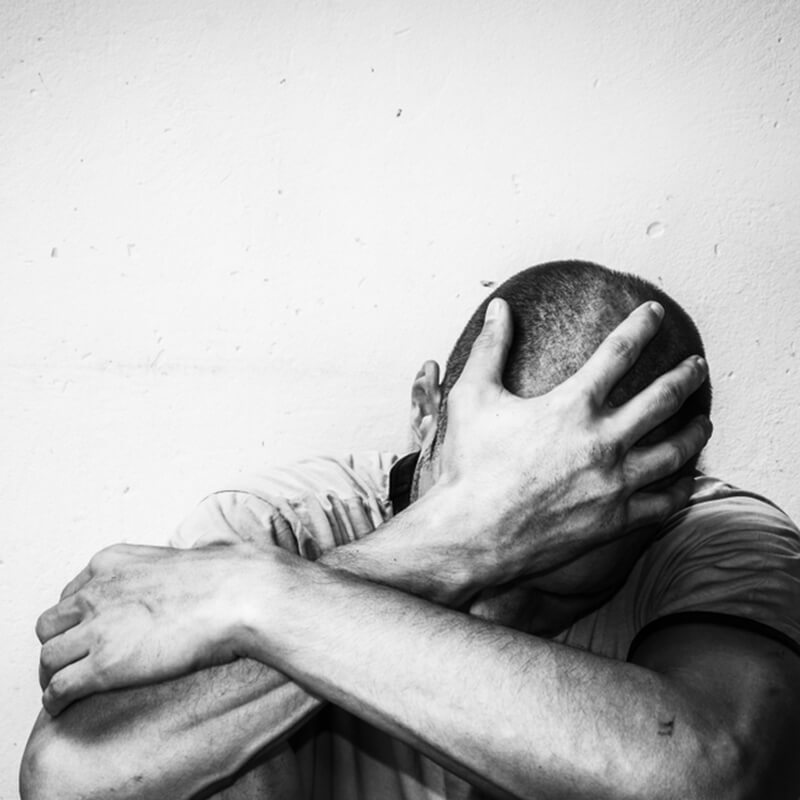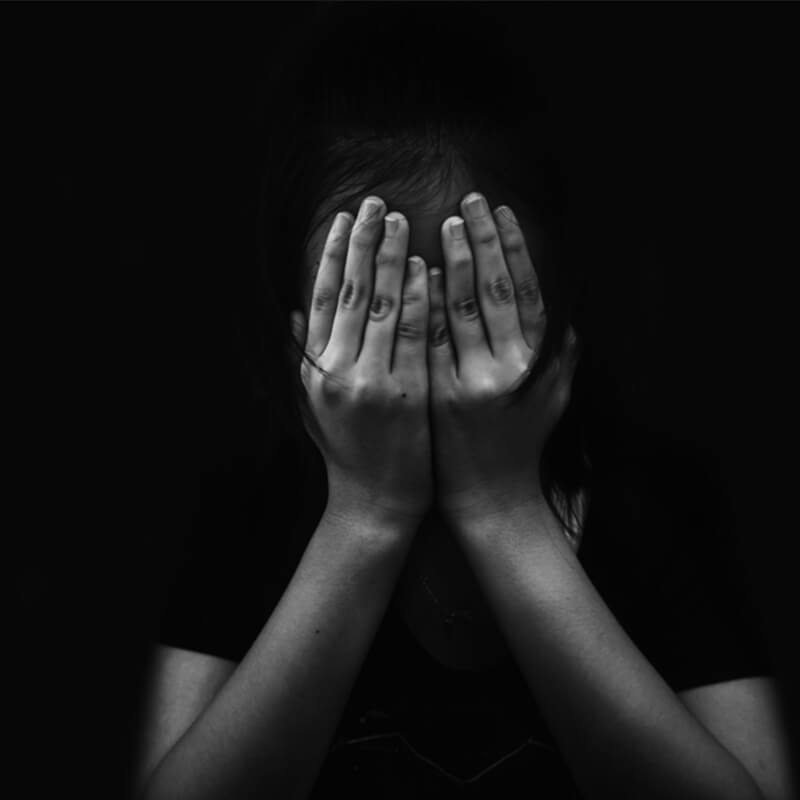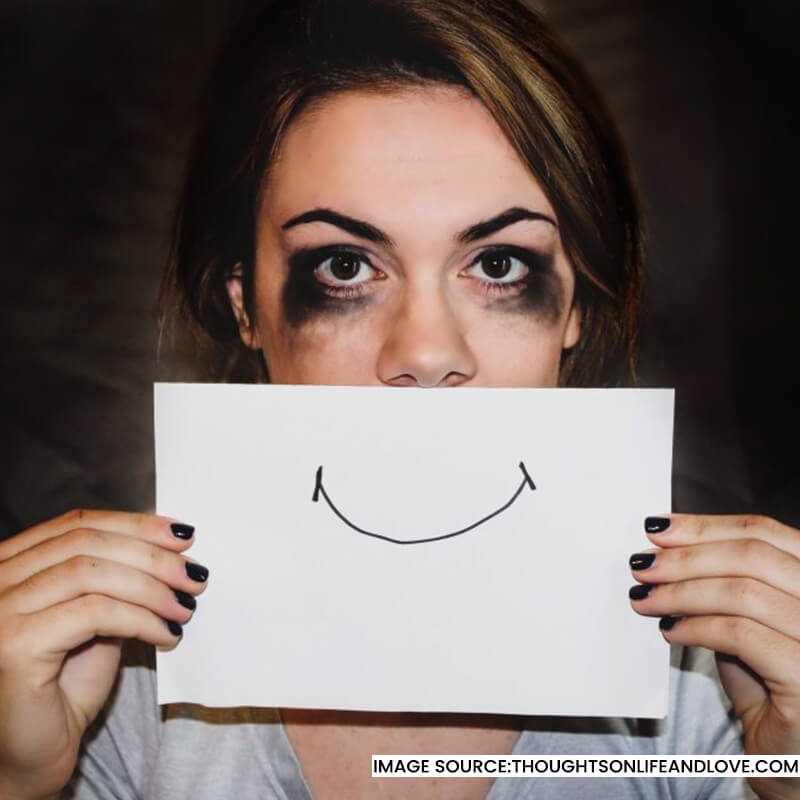Depression strikes an estimated one in 15 adults (6.7%) in any given year. And one in six people (16.6%) will experience depression at some time in their life. Depression can occur at any time in the given lifetime, but on average, depression strikes on the late teens and mid 20 youngsters majorly. Women are more likely to experience depression more than men. Multiple studies show that one-third of women will experience a major depressive event in their lifetime. There is a great measure of heritability (approximately 40%) when first-degree relatives (parents/children/siblings) have depression.
People who are dealing with depression for a long time and with moderate or severe intensity, then this mental illness may become a serious health condition and can also cause major negative decision in one's life like suicide. It can cause the concerned person to suffer greatly and function poorly at work, at school and in the family. At its worst, depression can lead to suicide. Close to 8,00,000 people die due to suicide every year across the Globe. Suicide is the second leading cause of death in 15-29-year-olds, superceding death due to cancer and heart diseases.

Although there are useful, effective and known treatments for mental depression, between 76% and 85% of people in low- and middle-income ranges receive no treatment for their depression and most of them are unaware of the problem and its solution itself. Obstacles to effective care include a lack of resources, lack of trained health-care providers and, feeling ashamed, insecure while talking about it, the social stigma associated with mental disorders.
The Government of India launched the National Mental Health Programme (NMHP) in 1982, opening the heavyweight of mental illness in the community, and the absolute inadequacy of mental health care foundation in the country to deal with it.
3 main components of NMHP-
1)-Treatment of Mentally ill
2)-Rehabilitation
3)-Prevention and promotion of positive mental health.
WHO supports governments in the goal of strengthening and promoting mental health. WHO has evaluated the evidence for promoting mental health and is working with governments to disseminate this information and to integrate effective strategies into policies and plans.
( https://www.who.int/health-topics/mental-health )
Mental health matters, but the world has a long way to go to achieve it.
Many unfortunate trends must be reversed - neglect of mental health services and care, and abuses of human rights and discrimination against people with mental disorders and psychosocial disabilities.
The Government of India has appointed a Policy Group to prepare a National Mental Health Policy and Plan. There are many top NGOs in India working to help common people who are dealing with mental illness. Some field-based NGOs conduct seminars, programmes with the main objective of helping the people who are struggling in silence.

Depression causes feelings of sorrow, loss of interest in activities which were once enjoyed, feeling alone and cut off from the rest of the world. It leads to a variety of emotional, sensitive and physical problems and can reduce one's ability to function at work and home. Some of the major causes of depression are:

Depression and anxiety disorders are different, but an individual with depression usually experiences symptoms similar to those of an anxiety disorder, such as nervousness, irritability, and problems, stress, sleeping and concentrating. But each disorder has its own conditions and its own emotional and behavioural symptoms.
Many people who acquire depression have a history of an anxiety disorder earlier in life. There is no indication that one disorder causes the other, but there is definite proof that many people suffer from both disorders.
Self-consciousness
Parents might use words like Broody, introspective, self-conscious, even self-absorbed from time to time to describe teens. While it's true that many preteens and adolescents exhibit these characteristics, the study has shown there may be a connection between depression in children and increased self-focus.
Generally people with depression tend to think about themselves, analyse their personalities, nature, behaviour, act over their feelings, and question their motives, purposes, reasons more than non-depressed people do. At first, it may appear counterintuitive that a person with depression would be self-focused, but the actuality is that depression tends to give people a heightened sense of self-consciousness.
Self-consciousness or a negative sense of self-awareness tends to increase negative emotional states (such as sadness, hopelessness, loneliness or anger). In these states, a person is more likely to focus on setbacks that may have caused an impact in their personal life and negative experiences, which continues to feed the emotional cycle of depression.
Self Love is lost in today's generation, with social media acting as a major platform where a person constantly compares each other and neglects to respect themselves and act on the basis of likes and comments of strangers.

Stress is good for you. It keeps you alert, gives a grip on your decision, motivates to do a better job and is primed to respond to danger. Anyone who has to face a work deadline or compete in a sport, work in a non-positive environment knows, stress prepares the body to respond, improving performance and helps in developing a better personality. Yet too much stress, pressure or chronic stress may lead to extreme depression in sensitive people.
When a person fails to shut off stress and reset their life after a difficult situation has passed, it can lead to any mental disorder mainly leading to depression.
No one in life escapes situational stress, such as the death of a loved one, a job loss, divorce, a natural disaster such as an earthquake, tsunami or a pandemic.

People struggling with depression, anxiety, stress may have also experienced the fear that this phase will near the end and they will be stuck in this never ending circle of invisible pain. Fear leads to loss of confidence, self-control, a person's way of thinking about life. Fear tends to lead in the loss of a positive attitude, glimmers of optimism, motivation, and to bring a change that will help fight all the insecurities.
The COVID, also a depression pandemicThe outbreak of coronavirus has not only taken a toll on people's physical health but also their state of thought, mind and consciousness. With most individuals isolating themselves after being constantly revealed to the news surrounding coronavirus, stress and anxiety are on the rise. Families who lost their earning member missed their earlier activities, disconnected with friends and families which leads to stress, anxiety, nervous breakdown and may eventually fall in the big hole of depression. Losing a loved one, getting dismissed from a job, going through a divorce or separation, and other difficult circumstances can lead a person to feel sad, lonely and scared. These feelings are common reactions to life's stressors. Most people feel low and sad at times, but when focused intensively on the feeling of sadness or emptiness that may cause depression or nervous breakdown.

Nervous breakdown
A nervous or mental breakdown is a terminology used to describe a phase of severe and intense mental distress. During this period, a person is unable to function in his/her everyday life or even do everyday chores. The person may experience physical, psychological, emotional and behavioural symptoms when going through a breakdown. The signs of a nervous breakdown differ from person to person.
Since the term is no longer used in medical society, a nervous breakdown has been described using a wide variety of symptoms. These include depressive symptoms, such as loss of hope and thoughts of suicide or self-harm, anxiety with high blood pressure, anger, tense muscles, clammy hands, dizziness, upset stomach, trembling or shaking, insomnia, hallucinations, fear, extreme mood swings or unexplained outbursts, paranoia, panic attacks and PTSD (post-traumatic stress disorder).
Indications
Signs on the person dealing with mental illness vary from a person to another, situations, goals, backdrop. These signs can be identified in the early stages where the depression has not made a major impact on one's life and mind. Some common signs are:
Feelings of helplessness and hopelessness.
Loss of interest in daily activities.
Sleep changes or Insomnia.
Anger or irritability.
Panic attacks.
Self-loathing.
Constant fear.
Self-isolating, trapping of mind.
Unexplained aches and pains.
Loss of focus
Suicidal thoughts
Deal with it, get over it

At times people forget that depression, mental illness is not uncommon or rare or is something to deal with total madness. It is very common and a natural human being action towards things, person or situation. Being depressed is as common as being happy, excited or sad on the basis of an event or because of a person.
Dealing with mental illness takes time and patience, which are both a lost cause in today's generation, but when a person decides to overcome it, then they surely can, all by their own or with the help of somebody or something. Here a few tips that a person can do who is dealing with this struggle in silence:
(P.S There is always someone who loves you for what you are and will help you no matter what, all you need to do is give yourself some time and find some peace within.)
Go for therapy / attain seminars and understand that you are not alone
Prescribed medication
Try staying positive
Reach out to other people who love you
Get moving, Exercise
Do yoga, meditation
Eat well and healthy
Take a break, go on a vacation
Find things that calm you
Take help
There are some dedicated NGOs working towards the goal of helping people who are affected with mental illness in our country. They run counselling services and suicide helplines for anyone in danger of committing suicide.
Organizations and NGOs who are best in the field of mental health are Anand Rehab Centre , Sanjivini Society For Mental Health, Mpower, Sneha and Agape Mental Health and Research Institute are some working towards the goal of helping people on how to deal with mental depression.
Taking help is not a sign of weakness when there are millions out there sailing in the same boat.
The Government of India has launched some of the numbers which are available in the time of your need, all you need to do is pick up the phone, dial the number and gather some strength to speak.
For people facing mental depression dial on:
08046110007
1800-599-0019
iCall: 022-25521111
For people having suicidal thoughts or self-harm thoughts:
Vandrevala Foundation Helpline – 1 860 266 2345
1-800-799-4889
AASRA : 09820466726 and many more.
“What mental health needs is more sunlight, more candor, and more unashamed conversation.”
- Glenn Close
 (1).jpg)